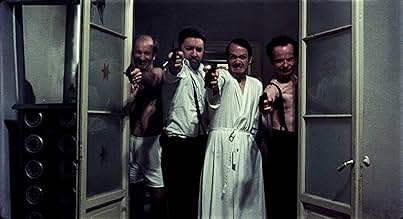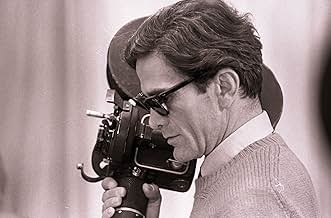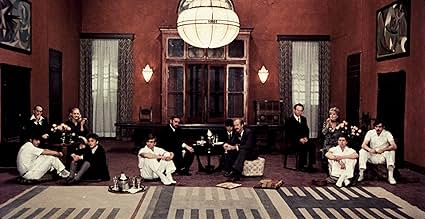
Durante la Segunda Guerra Mundial en Italia, cuatro fascistas libertinos acorralan a nueve adolescentes y los someten a ciento veinte días de tortura.Durante la Segunda Guerra Mundial en Italia, cuatro fascistas libertinos acorralan a nueve adolescentes y los someten a ciento veinte días de tortura.Durante la Segunda Guerra Mundial en Italia, cuatro fascistas libertinos acorralan a nueve adolescentes y los someten a ciento veinte días de tortura.
- Dirección
- Guión
- Reparto principal
- Premios
- 2 premios en total
- Eccellenza
- (as Umberto P. Quintavalle)
- Signora Vaccari
- (as Helene Surgere)
Resumen
Reseñas destacadas
Apparently based loosely on the Marquis de Sade's eponymous story, it feels dirty...it feels icky. You will not finish the film feeling happy, relieved, redeemed, or satisfied. You will feel that humanity is capable of terrible things and sometimes for no real reason other than they can. It shows what happens when people blindly follow terrible people and abandoned their own sense of decency. The following orders defense will never work. When you've become an accomplice you ate equally guilty.
This movie has depth, but it's not an easy watch. It's not for a simple eve with a date. I can't imagine watching this with anyone other than fellow film students or a significant other you've been with for years.
The film is about a group of rich Fascists during WWII-Nazi Occupied Italy, where they kidnap a group of 18 youngsters, allowing only physically perfect specimins to stay, and subject them to various forms of mental, physical and sexual torture over the next 120 Days. The torture starts off in a sexual nature--Sodomy, rape, humiliation and so on-- and slowly degrades and descends into mental and physical torture. Just when you think what you are seeing can't get worse, it does, ten-fold.
What makes Salo so brutally shocking and disturbing is its uncompromised and blunt way of showing the acts of horror. It is a very quiet and slow film, mostly shot using static and still cameras, it feels more like a documentary than a fictional film. It's clear upon viewing, that Pasolini wanted to remind us all that violence should not be entertainment. As such, every act of violence and degredation is drained of all its possible energy and excitement, and shown in a sad, painful light. Nothing is sugar coated, nothing is softened. This film is an attack on our desensitized feelings towards violence. Yet, at the same time, the film purposely desensitizes us to certain acts -- Such as rape. We see it so much during the film that it becomes "normality" to us, we barely raise an eyebrow. Upon realizing this, one also realizes how the horrible acts shown in the film are possible, and it's a terrible realization.
Salo continues to descend until at the end, when we are taken to the punishing grounds, where various rule breakers are tortured and murdered. This final sequence is the most harrowing and effective I've ever seen in a film. As the victims are tortured and murdered, each one of the fascist rulers take turns as voyer, watching from a second story window, far enough away to not hear the screams of terror and pain. And we watch with him. The film attempts to equate our viewing of this film to their viewing of the executions, after all, we're watching these acts for "entertainment", just as he is. And we distance ourselves from the acts in order to enjoy them, as he does by watching through binoculars far away. It's a savage and truthful attack, one that is impossible to deny.
Also incredibly unsettling is the inherent joy that the villains (Heroes?) feel at their victims pain, sadness and discomfort. Sometimes even to the point of sexual arousal. There is a scene where a girl is crying because her mother died trying to save her from these people. She is completely naked as she weeps, to us, she's the picture of vulnerability and sadness, to the fascists, it's the most exciting thing they've seen all day. The fascists all stand and watch her weep with the utmost sexualexcitement. It is terrifying. It's scenes like these that set Salo apart from other "gross out" movies. Some of the most affecting and frightening scenes are ones where there is quiet, watching the expressions and reactions of people to the various horrible acts.
Salo is a film of rage and sadness. It is a film that asks you to hate humanity, to hate what we're capable of; to look in the mirror and hate yourself. Then weep because nothing can be done about it. Nothing will ever change..
¿Sabías que...?
- CuriosidadesDespite the grim subject throughout the film, in an interview on the second disc of the Criterion Collection box set, actress Hélène Surgère claimed the mood was actually rather jovial on the set and that none of the teenage actors were actually harmed or traumatized. She said the abundance of teenagers who had never acted before led the mood to be happy and at times, even fun, with the cast often playing practical jokes on each other. She also said that the movie was literally "made" in the editing room and the filmmakers had no idea how grim a movie it was until they saw the finished product at the premiere.
- PifiasWhen the Duke kisses several victims during Sergio and Renata's wedding, some victims and Ezio begin to laugh, off the character.
- Citas
The President: [while eating a meal of feces] Carlo, do this with your fingers.
[the President sticks two fingers in his mouth]
The President: And say, "I can't eat rice with my fingers like this."
Male Victim: [with fingers in his mouth] I can't eat rice.
The President: Then eat shit, you little bastard.
- Créditos adicionalesEssential Bibliography: Roland Barthes: 'Sade, Fourier, Loyola' (Editions du Seuil); Maurice Blanchot: "Lautréamont et Sade' (Editions de Minuit; in Italy Dedalo Libri); Simone de Beauvoir: 'Faut-il brûler Sade' (Editions Gaimard); Pierre Klossowski: 'Sade mon prochain, le philosophe scélérat' (Editions du Seuil; in Italy SugarCo Edizioni); Philippe Sollers: 'L'écriture et l'experience des limites' (Editions du Seuil)
- Versiones alternativasThe film was rejected for cinema by the BBFC in 1976 and a private showing of the uncut version at the Old Compton Cinema Club in London's Soho resulted in a police raid and confiscation of the movie. A heavily edited version - minus 6 minutes of footage including scenes of torture, homosexuality and excrement eating, and including a 4 minute prologue describing the history of the town of Salo - was later prepared by UK censor James Ferman for club showings. The film was finally passed completely uncut for cinema and video in the UK in December 2000.
- ConexionesEdited into Histoire(s) du cinéma: Une histoire seule (1989)
- Banda sonoraPrelude in C minor
(uncredited)
Composed by Frédéric Chopin (uncredited)
Played by Arnaldo Graziosi (uncredited)
Selecciones populares
Detalles
- Fecha de lanzamiento
- Países de origen
- Idiomas
- Títulos en diferentes países
- Salò, or the 120 Days of Sodom
- Localizaciones del rodaje
- Empresas productoras
- Ver más compañías en los créditos en IMDbPro
Taquilla
- Recaudación en todo el mundo
- 1.808.595 US$
- Duración
- 1h 57min(117 min)
- Mezcla de sonido
- Relación de aspecto
- 1.85 : 1

![Trailer [OV]](https://m.media-amazon.com/images/M/MV5BYTczYWExODUtNmQ3NC00MzRhLTkwMGQtNzRjM2M5ZGQzYmVkXkEyXkFqcGdeQXRyYW5zY29kZS13b3JrZmxvdw@@._V1_QL75_UX500_CR0)

























